The United Nations High Commission for Refugees (UNHCR) on Friday called on “countries neighboring Afghanistan to keep their borders open in light of the evolving crisis.”
One of those neighbors is China, which has taken great delight in President Joe Biden’s bungled withdrawal from Afghanistan but shows very little interest in harboring refugees.
UNHCR avoided directly criticizing the Taliban for either the internal or external refugee crises afflicting Afghanistan.
“Together with the wider UN country team, we are committed to staying and delivering aid to the Afghan people for as long as we have access to populations in need and can ensure safety for our staff,” the agency stated.
“The situation on the ground across the country remains extremely fluid,” the agency’s statement observed. “While widespread fighting has decreased since the takeover of the country by the Taliban on Sunday, the full impact of the evolving situation is not yet clear. Many Afghans are extremely anxious about what the future holds.”
UNHCR said it was concerned with getting “urgently needed” humanitarian assistance to the immense number of internally displaced Afghans, many of whom fled for sanctuary in Kabul only to watch the Taliban capture the capital city with little resistance.
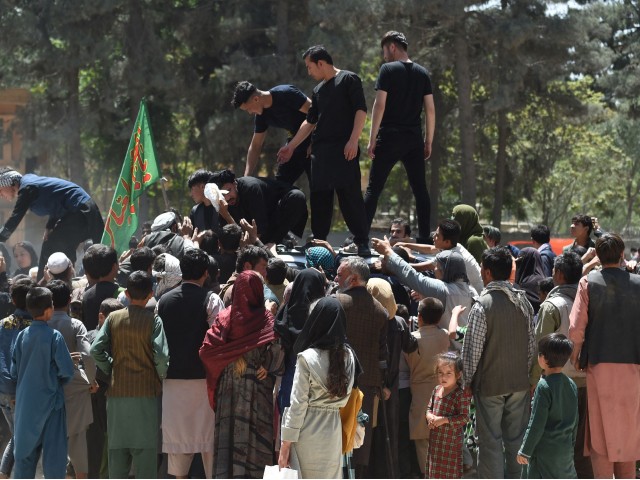
Internally displaced Afghan people, who fled from the northern province due to battles between Taliban and Afghan security forces, gather to receive free food being distributed by Shiite men at Shahr-e-Naw Park in Kabul on August 13, 2021. (Wakil Kohsar/AFP via Getty Images)
External migration was a top concern for the U.N. agency, which declared, “all states – and this applies to countries both within and outside the region – must preserve the right to seek asylum for Afghans arriving through regular or spontaneous means.”
“UNHCR remains concerned about the risk of human rights violations against civilians in this evolving context, including women and girls,” the statement said. “As of today, those who may be in danger have no clear way out. UNHCR is calling on countries neighboring Afghanistan to keep their borders open in light of the evolving crisis in Afghanistan.”
UNHCR said $62.8 million in funding is urgently needed to help internally displaced Afghans and to prepare for refugees fleeing across the border into neighboring countries. The agency noted its $351 million mission in Afghanistan “remains drastically underfunded at 43 percent.”
This appeal for more funds may encounter some resistance from foreign supporters who wonder why they should finance food and shelter for captive citizens of the Taliban’s “Islamic Emirate of Afghanistan,” while the Islamic Emirate and its partners in China get rich off Afghanistan’s mineral resources.
China has repeatedly heckled the United States for supposedly not taking enough Afghan refugees, but China closed its own borders decades ago and is notoriously lacking in enthusiasm for accepting refugees. China has no government policies for refugee resettlement and no national asylum law.
According to polls, the Chinese public is particularly opposed to accepting Middle Eastern or Muslim refugees.
Beijing famously refused to accept refugees from the Syrian civil war, even though it could have theoretically used the manpower to offset China’s collapsing population. Chinese officials and analysts grumbled that Europe and America should bear the burden of Syrian refugees as punishment for the “arrogance” they showed by meddling in Middle Eastern politics. There is little reason to suspect their attitude about Afghanistan will be different.
When Al Jazeera published a roundup of how regional powers are handling refugees from the Taliban on Thursday, it did not even bother mentioning China. Likewise, the Hindustan Times on Sunday produced a list of where Afghan refugees are going, and China was not mentioned.
According to Al Jazeera, Afghanistan’s other neighbors are not welcoming refugees with open arms, either. Iran is setting up emergency tents, but making it clear that fleeing Afghans will be “repatriated” as quickly as possible. Pakistani Prime Minister Imran Khan explicitly stated he will close his border to fresh refugees because there are already three million Afghan migrants living in his country. Turkey is building a border wall as quickly as possible, while Greece already completed a wall along its Turkish border to keep Afghans out.
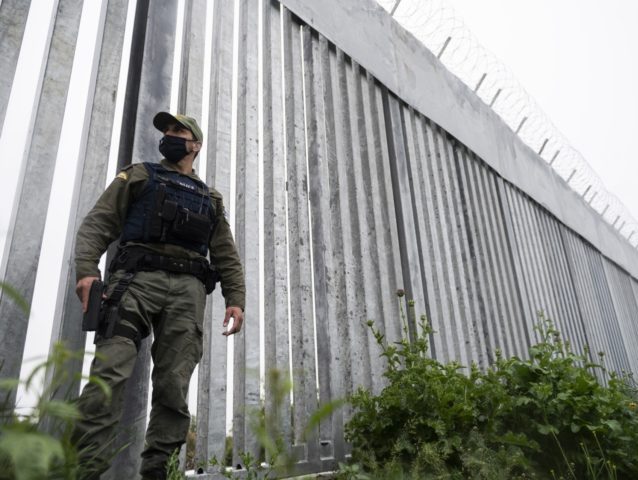
In this May 21, 2021, photo, a policeman patrols alongside a steel wall at Evros river, near the village of Poros, at the Greek -Turkish border, Greece. (AP Photo/Giannis Papanikos, File)
Afghanistan’s three Central Asian close neighbors – Uzbekistan, Tajikistan, and Turkmenistan – “panicked” when the Taliban began sweeping across Afghanistan and made it clear they will not accept large numbers of Afghan refugees, as Al Jazeera reported in a previous article. The Central Asian nations regard Afghan refugees as a security risk that could destabilize their own countries, especially if they bring the Taliban’s radical Islamist ideas with them.
China has similar concerns, fearing a flood of Muslim refugees from Afghanistan could pose security issues for Xinjiang province, home of the oppressed Uyghur people.
The Chinese government tries to justify its brutal crackdown in Xinjiang by claiming a dangerous Uyghur separatist organization called the East Turkestan Islamic Movement (ETIM) has been training with al-Qaeda and ISIS operatives in Afghanistan. China’s partnership with the new Taliban government reportedly included assurances that the Taliban will secure Afghanistan’s borders to prevent terrorists or refugees from flooding into China. The U.S. government has asserted that ETIM does not exist.
Russia, which like China has made overtures of friendship to the Taliban, clearly has no intention of helping with the refugee crisis.
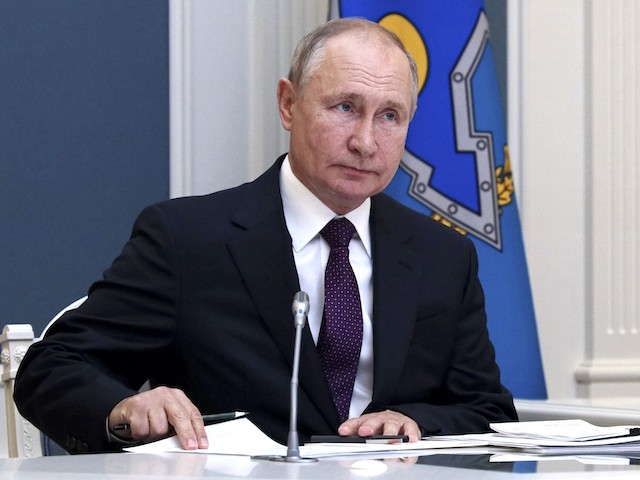
Russian President Vladimir Putin takes part in a virtual meeting with leaders of the Collective Security Treaty Organisation to discuss the situation in Afghanistan in Moscow, Russia, August 23, 2021. (Evgeniy Paulin, Sputnik, Kremlin Pool Photo via AP)
Russian President Vladimir Putin said on Sunday he is concerned “Afghan militants” could enter Russia “under the guise of refugees,” and sharply criticized the United States for asking Central Asian countries to shelter thousands of people fleeing from Afghanistan.
“Our Western, let’s say, partners are persistently raising the issue of placing refugees in Central Asian countries before those receive visas from the United States or other countries. They think they can send them without visas to our neighbors, but refuse to receive them in their own countries without visas? What a humiliating approach to solving this issue is it?” Putin sneered.
Putin said the Russia-led Collective Security Treaty Organization (CTSO) was cool toward accepting Afghan refugees because vetting them for security concerns in the chaos of fallen Afghanistan would be so difficult.
“We share common borders, but there are no visa restrictions. Imagine that refugees entered any of these countries. Who is among these refugees, how do we know? There may be thousands of them, or even hundreds of thousands, and maybe even millions,” Putin said.
Afghan refugees in India held a protest at the UNHCR office in New Delhi on Monday, demanding more educational benefits, job opportunities, security assurances, and more options for permanent resettlement.
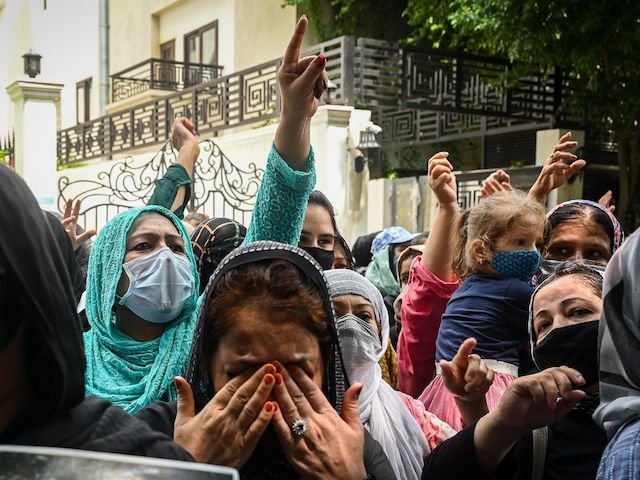
Afghans residing in India take part in a demonstration outside the UNHCR office in New Delhi on August 23, 2021. (Sajjad Hussain/AFP via Getty Images)
“As of 2019, Afghans accounted for around a third of the nearly 40,000 refugees registered in India, according to the UN refugee agency, but these figures do not cover those who are not registered with the U.N.,” the Hindustan Times noted.
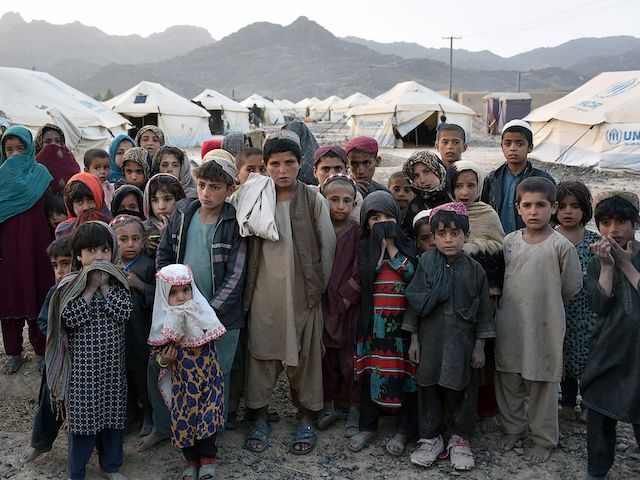
COMMENTS
Please let us know if you're having issues with commenting.